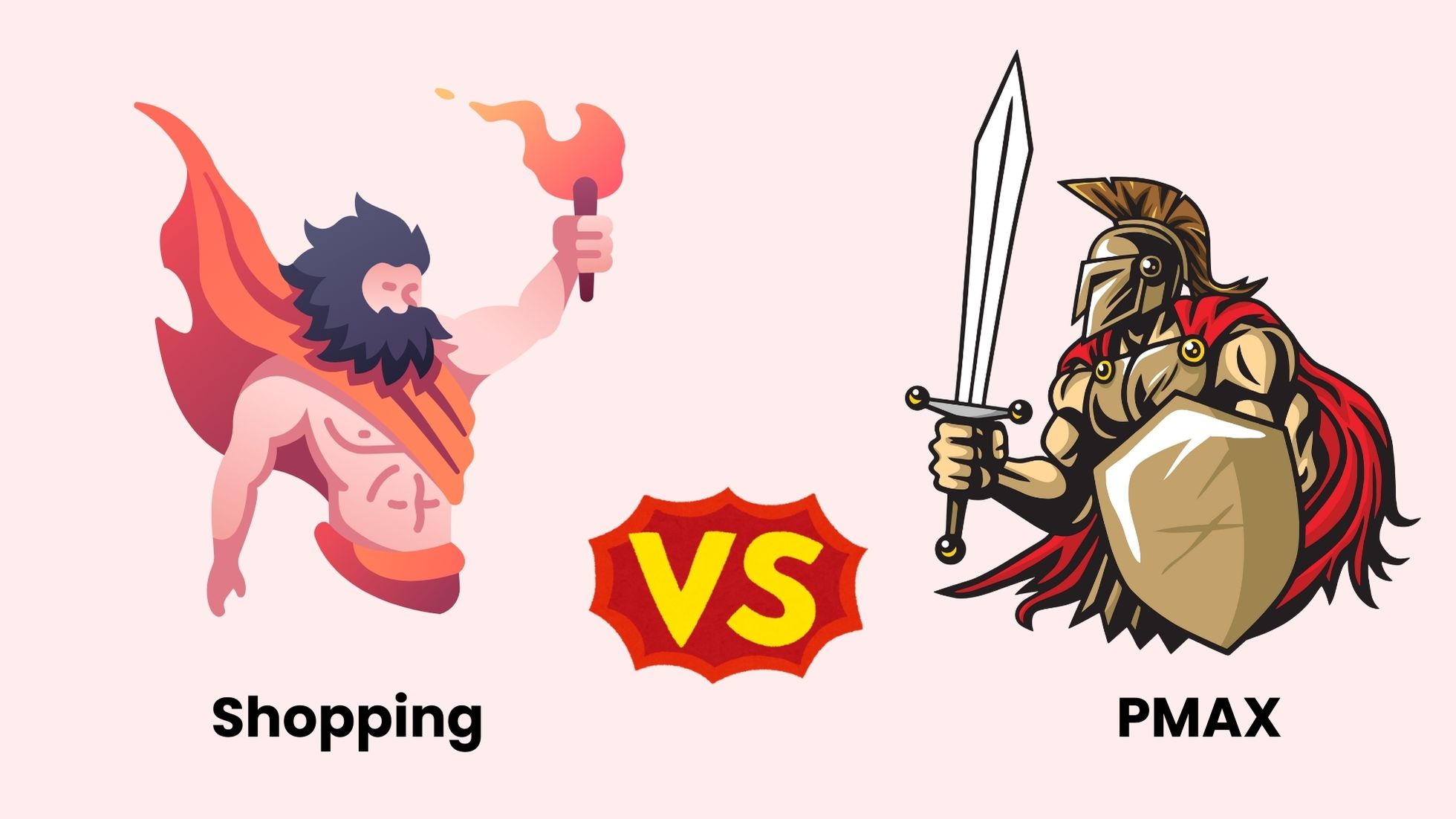
I'm going to take a WILD guess about you: You work for an ecommerce brand, you’re running Google Ads, or paying someone to manage it for you but you’re not sure if it' better to use Performance Max or Standard Shopping campaigns.
Have I impressed you with my mind reading abilities? (I hope so…)
The eternal dilemma between Standard Shopping and Performance Max is easier to answer than you might think.
Good vs evil, old vs new, control vs automation. But who shall win?
I’ll answer this question and expand on the traits of each campaign for your consideration.
ps. This article is for ecommerce PPC accounts. If you’re looking for pMAX for lead generation, I have another article just about that.

Performance max campaigns really are a black box. Yes, we get some data, but it's just not enough.
pMAX is the so called flagship campaign type by Google. If I had to sum it up, I’d say that it does whatever it wants, whenever it feels like it (or whatever Google wants).
pMAX campaigns use a mixture of shopping feed information together with assets like images, text and videos that you add into asset groups. They
You have very little control of Performance Max campaigns. They spend your budget where they want to and any adjustments can mostly be made at campaign level. What more, any adjustments you make can have unexpected results. For example, if you increase the budget because of good performance, it might spend it on channels like display and not necessarily give you the expected returns.
Yes, it does. For the most part, pMAX does a good job with ecommerce accounts but there a few issues to watch out for, like brand searches or cannibalising other campaign types.
pMAX is hard to scale and requires a good volume of conversions and data to work well. To a certain degree, you can only get so much with a pMAX campaigns before you run out of options.
A much simpler campaign to understand, Standard shopping campaigns show product from a shopping feed in Google’s search results. They can also appear in search partners.
Standard shopping campaigns offer manual and automated bidding. They give a lot more control on bids, search terms, negative keywords and audiences. They also offer a lot more data to help make decisions.
Yes. Standard shopping campaigns do what they say on the tin. The might get slightly lower ROAS but they do offer more control and options to optimise and scale. You can easily avoid brand search making your ROAS (return on ad spend) looking to rosy.
| Performance Max | Standard Shopping |
|---|---|
| Omni-channel. Ads appear on Search, Display, Youtube, Gmail and Discover with no control on where the spend goes. | 100% shopping ads on search (and search partners if opted in). |
| Fully Automated with almost no control. | Manual or automated bidding with controls at many levels. |
| No control on asset groups. Automation will decide how much budget gets spent on each one. | Ad group & product group level bidding, effectively controlling how spend is directed. |
| Search themes give some insights into searches that drive clicks and sales. | |
| Negative keywords can by filling a form and sending it to Google support (seriously). | Search term data allowing insights and control using negative keywords. |
| If you do not add your own Youtube video, pMAX will automatically create slideshows with music from your image and text assets. They look really bad. | |
| Can use target ROAS portfolio strategies. There are two advantages with these: CPC capping & shared learning across campaigns. |
In the ‘field’, both campaigns are valid options for ecommerce brands. Here’s when I would choose standard shopping campaigns:
Since the launch of Performance Max campaigns, Google gave them a much higher priority than Shopping. This meant than an account with both campaign type would see pMAX take all the volume and Shopping getting very few impressions and clicks.
Since October 2024, Google has announced a change, and Shopping campaigns now hold the same weight as pMAX. In the past, running shopping meant more control but smaller volumes. Now you can run shopping and get good volume levels.
With this recent change, the balance for Shopping campaigns has gone up again.
If you’re an experienced PPC consultant and know how to manage and optimise campaigns, Google Shopping gives you the buttons and levers needed to stir your account to your destination.
Performance Max is more like a self driving car, but without a clear destination. It can work really well, but there’s very little to do when it doesn’t. And if you want to change things, they don’t really work like you want them to.
With the recent, much welcomed announcement from Google, the two campaign types can also work well together. With shopping doing most of the work and pMAX running on a lower budget.
We're a PPC specialist marketing agency. Managing Google Ads for ecommerce brands is our bread and butter. If you'd like a PPC audit or have any questions, shoot us an email and we'll be glad to help.
Odi Caspi - Founder and lead PPC'er
EffectiveMarketing.uk

 PPC ServicesEcommerce PPCLead Gen PPCGoogle Ads AuditsWalmart Connect PPCDigital Marketing GuidesContact
PPC ServicesEcommerce PPCLead Gen PPCGoogle Ads AuditsWalmart Connect PPCDigital Marketing GuidesContact